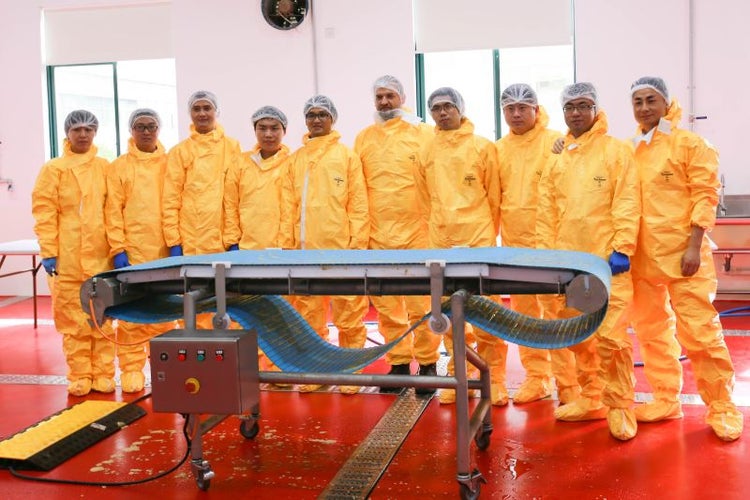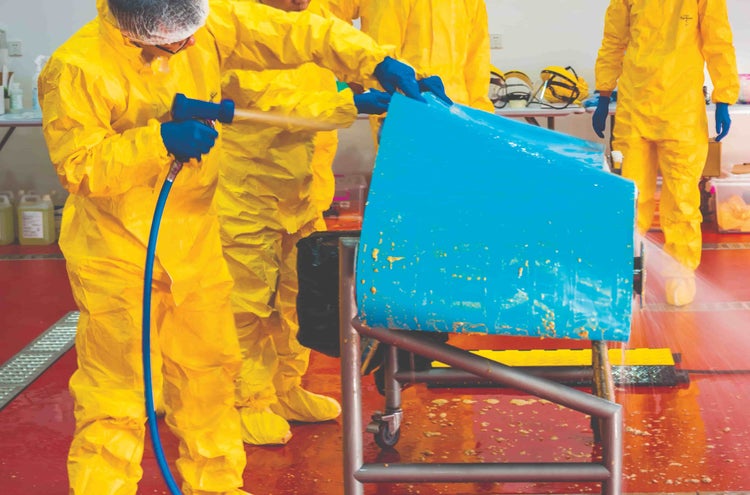IAFP Beyond the Bio: A Journey of Lifelong Learning

When it comes to food protection and quality assurance, meticulous attention to detail can mean the difference between health and harm. Nathan Mirdamadi, food safety manager and quick serve restaurant lead with Commercial Food Sanitation (CFS), stands ready to support his partners, ask the right questions, and create a path forward to safe and healthy outcomes for the end consumer.
Nathan considers his start in the food industry as “nontraditional” — though he shared he knows a lot of people who, like him, stumbled into the industry after gaining an unrelated undergraduate degree. As he was working toward his bachelor’s in economics and finance at Missouri Southern State University, he took his first position in manufacturing at a commercial bakery for the grocery chain Safeway. “At the time, I had people tell me to quit the bakery, as it seemed impossible to work in manufacturing and finish college,” Nathan said. “But I was quickly promoted to oversee the production. … I was 20, working the third shift, and paying for college. While incredibly difficult at times, I knew it would lead to other opportunities.”
And it did. Safeway offered him his first job after college in corporate finance, which he did for several years. But the allure of being hands-on beckoned him back to the food manufacturing industry. “It could have been my age at the time,” Nathan said, “but I quickly realized I didn’t enjoy sitting at a desk all day.”
"Sanitation is so interesting to me. There’s chemistry, microbiology, and even in some cases mechanical engineering or fluid dynamics. This role touches so many different sciences.”
Nathan did enjoy learning. He has always had a strong desire to understand the "why" behind every process. "I think having that ability to consistently question ‘why do we need to do certain things’ has been fundamental in helping me in the food industry, especially when it comes to food safety and sanitation," Nathan explained. It’s what led him to get his MBA from California State University and follow that up with a master’s degree in food safety from Michigan State University. Early in his career, he was recruited to join the Kraft Foods team as a sanitation manager. “Sanitation may seem mundane to some people, but it’s so interesting to me,” he said. There’s chemistry, microbiology, and even in some cases mechanical engineering or fluid dynamics. This role touches so many different sciences.”
"We build out continuous improvement plans with each QSR supplier, and then we work with them over the years to get better and continue to reduce risk — reducing risk to the QSR brand but, more importantly, the end consumer which is ultimately both my family and yours.”
His thirst for learning the root causes of the challenges in food safety is what led him to his current role with CFS. “A significant aspect of CFS's operations revolves around servicing the supply chain needs of Quick Service Restaurant (QSR) businesses. Consequently, we have established deep partnerships with various customers, including prominent names like McDonald’s and Yum!,” he said. “We're working with their suppliers and consulting on sanitation, environmental monitoring, and hygienic design. It's all about continuous improvement rather than auditing. We build out continuous improvement plans with each supplier, and then we work with them over the years to get better and continue to reduce risk — reducing risk to the QSR brand but, more importantly, the end consumer which is ultimately both my family and yours.”
As he looks at the emerging trends in the industry, Nathan recognizes labor and automation as two areas that will require continuous improvement and industry collaboration. Labor shortages have hit every industry, but he says the sanitation and cleaning-related careers have become difficult to properly staff. When pairing that with the increasing complexity of the food supply chain, he emphasized the importance of staying ahead of the curve. "People have started to appreciate the importance and nobility of the work we do within the food safety and sanitation space of the food industry,” he said. “But it’s not applauded or appreciated to the extent it should be. While I recognize there is always room for improvement, we should also celebrate that we have made lots of progress."
Embracing emerging technologies like automation and AI has the potential to revolutionize food safety including sanitation practices. However, he also understands the inherent risks of integrating new technologies. “I am fascinated by how AI and automation could come together and impact our food supply over the next five years. AI, I think, will play a role in helping to discover the cause of illnesses, which may be acute or chronic, that we have no idea are harming people,” he said. “Automation will also have a huge impact on our business, serving as a solution for several challenges. But if companies are not diligent when considering the cleaning and hygienic design risks they could be introducing, it can lead to bigger problems. We need to make sure this aim to increase speed and production ability does not lead to contamination and/or outbreaks.”
As Nathan reflects on his journey, one thing is clear: His love of learning has been the driving force behind his success. As he continues to push the boundaries of innovation and excellence, Nathan Mirdamadi stands as a testament to the transformative power of curiosity and perseverance in the pursuit of a safer, healthier food supply. “What’s great about this industry is that there is always so much to learn, and that’s a point of enjoyment for me rather than frustration. I love bringing that passion to our training courses at the CFS Institute. There will never be an end to what I can learn but sharing what I have learned with those who have different or less experience is exhilarating.”
Fun Facts
- Nathan is bilingual in English and Spanish. He learned Spanish while working in manufacturing and also through formal education. From supervising production lines to working internationally, these language skills have proved invaluable in communicating with the diverse workforce of the food industry.
- He’s lived in a variety of places for work, including Phoenix, Arizona; Central Valley, California; and Pittsburgh, Pennsylvania, where he originally worked for Heinz and then eventually started working for CFS. With the ability to work from anywhere, he and his family decided to move back home to Joplin, Missouri — where they currently reside — to be closer to family.
- While he loves discussing cleaning, hygienic design, and environmental monitoring programs when attending IAFP’s annual meetings, he also looks forward to hearing about the nuances of the different aspects of the industry he’s possibly not exposed to every day.



